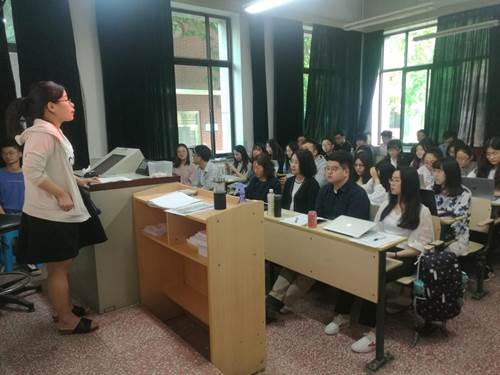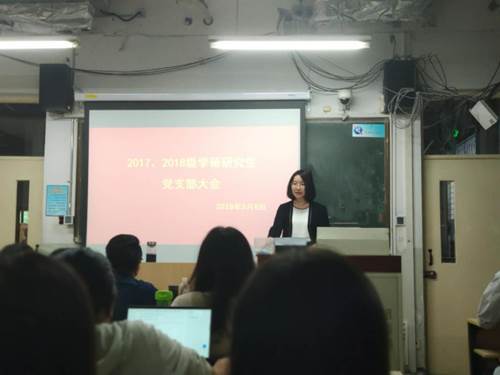In order to strengthen the construction of Student PartyBranch and implement the task of “following benchmarks of Party constructionand working toward advanced institutions,” the CPC Committee of the BusinessSchool of Central University of Finance and Economics (CUFE) established aworking system under which members of the Party Committee help guide the workof the Student Party Branch. Party Committee members will directly participatein relevant activities of the Student Party Branch to guide its work, promptlyextracting experience and remedying weak points in terms of organizational development,system building, and ideological cultivation. The purpose of this system is tobring the work of the Party Branch to a new height.
On May 8, 2019, the Meeting of Student Party Branch ofGraduate Students for Academic Master’s Degrees of Class 2017 and 2018 on PartyMember Development Plan and Full Party Membership was held at Room 101 of themain teaching building. Ge Jianxin, Party Secretary of the CUFE BusinessSchool, and Han Lan, the Branch organizer, attended the Meeting. Zhang Dian,Secretary of the Student Party Branch, presided over the Meeting.
At the beginning of the Meeting, eight active applicants forParty membership, including Zhao Qian, Wang Fangyuan, Chen Yanan, Wu Yucun,Zhang Yaping, Li Ye, Song Xin, and Zhang Yujia, reported their progress in ideology,study, life and work after their enrollment at the Meeting.

Anactive applicant for Party membership made her report
Next, Party liaisons of these applicants, including DaiMoxuan, Hou Yifan, Zhang Jing, Tang Yanfei, Zhang Fan, Wang Keshuo, Xue Huili,and Mu Ningning, gave comments on their ideological and actual performance. Itwas agreed at the Meeting through discussion and voting that these eight activeapplicants could be included into the Party member development plan of theyear.
Later on, four probationary Party members, including ZhangJuyuan, An Chenxing, Song Anqi, and Yao Keyu, made applications for full Partymembership. Party members, including Dai Moxuan, Hou Yifan, Mu Ningning, ZhangFan, and Zhang Jing, gave comments on the ideological and actual performance ofthese four probationary members. It was agreed at the Meeting throughdiscussion and voting that these four probationary Party members could be grantedfull membership on schedule.
Party Secretary Ge concluded the Meeting in the end. Sheexpressed appreciation for this Party Branch meeting from three perspectives,namely sufficient preparations, sound procedures, and good educational effects.As she said, in pursuing development, the Party Branch must stress itspolitical attributes, promote standardization to sum up experience and lessons,implement strict standards of Party member development, and render Party membereducation more effectively.

PartySecretary Ge concluded the Meeting
She then suggested that Party members combine the work of theParty Branch with the thinking mode of management science, to apply what they havelearnt to the work of the Party Branch after mastering relevant learning toolsand thinking modes. In this way, Party members could push forward their workwith appropriate methods and informed perspectives. She also encouraged allmembers of the Party Branch to give full play to the vanguard and exemplaryrole of Party members in future work and study, so as to promote the work ofthe Party Branch and the Party Committee to a new height in their own ways.



